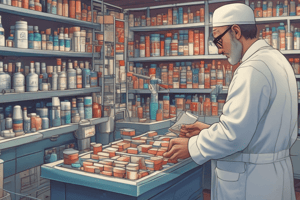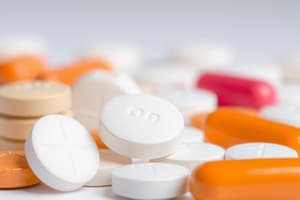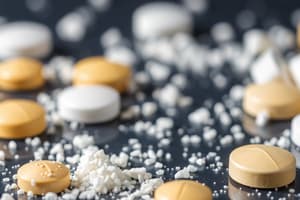Podcast
Questions and Answers
What is the primary advantage of effervescent tablets?
What is the primary advantage of effervescent tablets?
- They are typically filled with oils
- They are portable and convenient (correct)
- They are more accurate than other dosage forms
- They are implanted beneath the skin
Which type of capsules is usually filled with oils or active ingredients suspended in oils?
Which type of capsules is usually filled with oils or active ingredients suspended in oils?
- Soft-shelled capsules (correct)
- Effervescent tablets
- Hard-shelled capsules
- Pellets
What makes oral suspensions more flexible than tablets and capsules?
What makes oral suspensions more flexible than tablets and capsules?
- Flexibility to meet specific patient needs (correct)
- Stability concerns
- Improved accuracy
- Swallowing challenges
Why do oral suspensions require stability studies?
Why do oral suspensions require stability studies?
What are the advantages of tablet formulations in pharmaceutics?
What are the advantages of tablet formulations in pharmaceutics?
What is a primary disadvantage of hard-shelled capsules?
What is a primary disadvantage of hard-shelled capsules?
Why are tablets not suitable for immediate therapy?
Why are tablets not suitable for immediate therapy?
Which type of tablet is used for children and is flavored?
Which type of tablet is used for children and is flavored?
What type of tablet is coated to prevent acid destruction in the stomach?
What type of tablet is coated to prevent acid destruction in the stomach?
Which type of tablet is placed under the tongue to be absorbed directly into the bloodstream?
Which type of tablet is placed under the tongue to be absorbed directly into the bloodstream?
What are the disadvantages of tablet formulations in pharmaceutics?
What are the disadvantages of tablet formulations in pharmaceutics?
What is a key feature of hard capsules in pharmaceutical formulation?
What is a key feature of hard capsules in pharmaceutical formulation?
Why must liquid formulations in hard capsules have low viscosity?
Why must liquid formulations in hard capsules have low viscosity?
What sets softgels apart from hard capsules in pharmaceutical formulation?
What sets softgels apart from hard capsules in pharmaceutical formulation?
Which factor is crucial in the selection of dosage form between tablets and capsules?
Which factor is crucial in the selection of dosage form between tablets and capsules?
Why do softgels play a significant role in pharmaceutical product development?
Why do softgels play a significant role in pharmaceutical product development?
What is a critical aspect of drug development related to pharmaceutical formulation?
What is a critical aspect of drug development related to pharmaceutical formulation?
What is the primary purpose of excipients in tablet formulations?
What is the primary purpose of excipients in tablet formulations?
How do functional excipients differ from regular excipients in tablet formulation?
How do functional excipients differ from regular excipients in tablet formulation?
What role do disintegrants play in tablet formulations?
What role do disintegrants play in tablet formulations?
Why are prototype products tested for properties like hardness and disintegration time during tablet formulation development?
Why are prototype products tested for properties like hardness and disintegration time during tablet formulation development?
In the context of capsule formulation, what makes select functional excipients crucial for product development?
In the context of capsule formulation, what makes select functional excipients crucial for product development?
What distinguishes functional excipients from other excipients in capsule formulation?
What distinguishes functional excipients from other excipients in capsule formulation?
Flashcards
Tablet Formulation
Tablet Formulation
A solid dosage form, easy to manufacture, portable, and convenient for patients.
Chewable Tablet
Chewable Tablet
Flavored tablets often used for children.
Enteric-coated Tablet
Enteric-coated Tablet
Tablets coated to protect from stomach acid.
Sublingual Tablet
Sublingual Tablet
Signup and view all the flashcards
Effervescent Tablet
Effervescent Tablet
Signup and view all the flashcards
Capsule Formulation
Capsule Formulation
Signup and view all the flashcards
Hard-shelled Capsule
Hard-shelled Capsule
Signup and view all the flashcards
Soft-shelled Capsule
Soft-shelled Capsule
Signup and view all the flashcards
Oral Suspension
Oral Suspension
Signup and view all the flashcards
Tablet Drawbacks
Tablet Drawbacks
Signup and view all the flashcards
Oral Suspension Advantages
Oral Suspension Advantages
Signup and view all the flashcards
Oral Suspension Disadvantages
Oral Suspension Disadvantages
Signup and view all the flashcards
Pharmaceutics
Pharmaceutics
Signup and view all the flashcards
Study Notes
Pharmaceutics: Understanding Tablet, Capsule, and Oral Suspension Formulations
Pharmaceutics is the branch of pharmacy that deals with the design, development, and production of pharmaceutical products. One of the primary focuses of pharmaceutics is the formulation of drugs into various dosage forms, including tablets, capsules, and oral suspensions.
Tablet Formulation
Tablets are one of the most common solid dosage forms. They are simple to manufacture, portable, and convenient for patients to use. Tablets can be made to disguise unpleasant tastes and are easily identified by healthcare professionals. However, there are some drawbacks to using tablets. Not all drugs are suitable for oral use, as some may be degraded by stomach acid or deactivated by the liver. Additionally, tablets may not be suitable when immediate therapy is needed, as they take time to be degraded by the GI tract, absorbed into the bloodstream, and delivered to the site of intended action. Tablets are also not suitable for patients who are unable to swallow or for drugs that are poorly absorbed by the GI tract, requiring high doses.
Types of Tablets
- Chewable tablets: These are flavored tablets that are often used for children.
- Enteric-coated tablets: These tablets have a coating that prevents acid destruction in the stomach.
- Sublingual tablets: These tablets are placed under the tongue to be absorbed directly into the bloodstream.
- Effervescent tablets: These tablets dissolve in liquid to release carbon dioxide.
- Pellets: These are small tablets that can be implanted beneath the skin or used for rectal or vaginal administration.
Capsule Formulation
Capsules are another commonly used dosage form. They contain powder or liquid drug substances. There are two primary types of capsules: hard-shelled and soft-shelled.
- Hard-shelled capsules: These capsules are made of two halves that fit together and contain powder or liquid medication.
- Soft-shelled capsules: These capsules are typically filled with oils or active ingredients that have been suspended or dissolved in oils.
Capsules have many advantages similar to tablets. They are convenient to take, portable, and do not have an unpleasant taste. They are also easy to produce on a mass scale.
Oral Suspension Formulation
Oral suspensions are liquid dosage forms that are often used for pediatric patients or for drugs that are not easily formulated into other solid dosage forms. These suspensions can be compounded from powders or granules. However, they require stability studies to ensure they remain stable over time and to prevent underdosing or the formation of precipitates.
Advantages of Oral Suspensions
- Improved accuracy: Oral suspensions can be more accurate than other dosage forms, especially when age-appropriate commercial medicines are not available.
- Flexibility: They are more flexible than tablets and capsules, as they can be compounded to meet specific patient needs.
Disadvantages of Oral Suspensions
- Stability concerns: Oral suspensions may be subject to microbiological growth and require rigorous compounding and stability studies to ensure their safety.
- Administration challenges: Swallowing of oral suspensions may not be complete, especially in young children, which could lead to underdosing.
In conclusion, pharmaceutics encompasses a wide range of dosage forms, including tablets, capsules, and oral suspensions. Each formulation has its advantages and disadvantages, and the choice of dosage form depends on the specific drug and patient needs. Understanding these formulations is crucial for optimizing drug delivery and ensuring patient safety and compliance.
Studying That Suits You
Use AI to generate personalized quizzes and flashcards to suit your learning preferences.
Description
Test your knowledge on tablet, capsule, and oral suspension formulations in pharmaceutics. Learn about the advantages, disadvantages, and types of tablets, capsules, and oral suspensions. Understand the importance of dosage form selection for optimizing drug delivery and ensuring patient safety.




